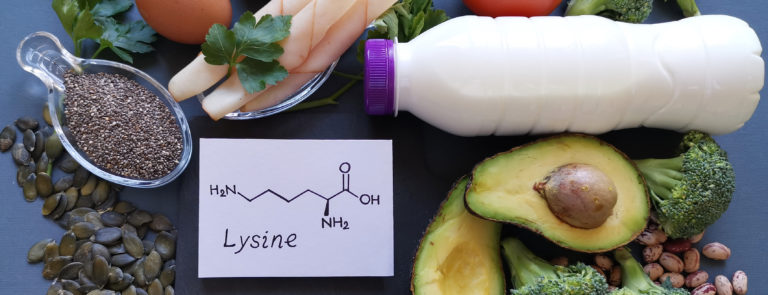15% off £30

Health benefits of lysine
25 Oct 2021 • 1 min read
- Health Hub Home
- Sports Nutrition
- Health benefits of lysine
Wondering what on earth lysine is and why it might benefit you?
You’ve come to the right place!
Useful for those looking to improve their recovery time after they exercise, lysine also has many other potential perks for the body and the mind…
First things first, what is lysine?
Lysine is a type of essential amino acid, and it’s needed by the body to make protein.
We can’t produce it ourselves, so we must get it through what we eat.
L-lysine is the form of lysine which can be used by our bodies; it’s this that’s present in a massive range of foods and in lysine supplements.
What are the health benefits of lysine?
While often used in sport nutrition products to support muscle growth and repair, l-lysine is also thought to aid several other processes in the body.
Here are four significant lysine benefits:
-
Lysine could improve athletic performance
Lysine’s role in protein production means it’s directly linked to the development of muscle.
It’s thought to aid in reducing the time it takes your body to recover after exercise by stimulating muscle synthesis and quickly repairing any damaged tissue.1
-
Lysine is a potential treatment for cold sores
Suffer from cold sores on your lips or around your mouth?
Lysine may reduce the time it takes for them to heal.
That’s because lysine can inhibit HSV-1 (herpes simplex virus type 1) which is typically responsible for triggering cold sores.2
-
Lysine may boost your bone health
Studies show that lysine has had some success at increasing the body’s ability to absorb and retain calcium.
Calcium is a mineral that’s needed to keep your bones strong and healthy, significantly when you’re growing or if you’re at risk of osteoporosis.3
-
Lysine could aid with anxiety
When combined with l-arginine (another essential amino acid), l-lysine is thought to be an effective treatment for anxiety.
This is because both substances can reduce the production of cortisol, a hormone made by the body when it’s under stress.4
Due to protein’s role in creating some different hormones and substances, lysine is additionally linked to various other essential bodily functions.
This includes making collagen in the skin, as well as aiding in the production of melatonin – the body’s sleep hormone.5
Sources of lysine
As previously mentioned, lysine cannot be made by the body, so must be sourced from either food or supplements.
High-protein foods often contain l-lysine. If you follow a plant-based diet, this will include things like:
- Soy-based products
- Avocados
- Potatoes
- Peppers
- Dried apricots or mango
- Chickpeas
- Spirulina
- Beans, including kidney beans and black beans
- Lentils6
Alternatively, you might want to try taking a lysine supplement.
L-lysine tablets come in different strengths which are very easy to incorporate into your daily routine.
As with any supplement, make sure you read the back of the packet correctly for advice on dosages.
Last updated: 25 October 2021
- https://www.livestrong.com/article/419397-the-effect-of-lysine-supplement-exercise/
- https://www.healthline.com/nutrition/lysine-benefits
- https://www.healthline.com/nutrition/lysine-benefits
- https://www.verywellhealth.com/can-lysine-help-to-heal-cold-sores-88922
- https://www.healthline.com/health/lysine-foods#benefits
- https://www.healthline.com/health/lysine-foods#lysine-in-vegetables


